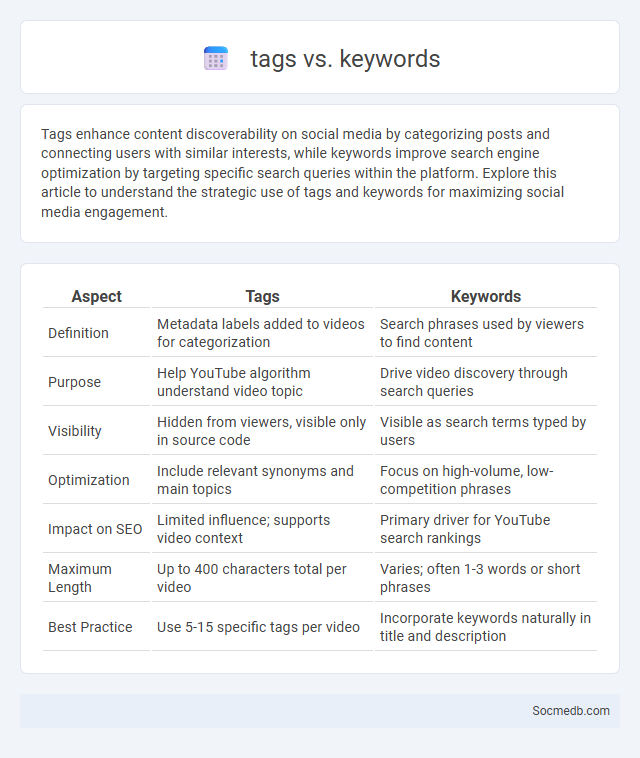
Photo illustration: tags vs keywords
Tags enhance content discoverability on social media by categorizing posts and connecting users with similar interests, while keywords improve search engine optimization by targeting specific search queries within the platform. Explore this article to understand the strategic use of tags and keywords for maximizing social media engagement.
Table of Comparison
| Aspect | Tags | Keywords |
|---|---|---|
| Definition | Metadata labels added to videos for categorization | Search phrases used by viewers to find content |
| Purpose | Help YouTube algorithm understand video topic | Drive video discovery through search queries |
| Visibility | Hidden from viewers, visible only in source code | Visible as search terms typed by users |
| Optimization | Include relevant synonyms and main topics | Focus on high-volume, low-competition phrases |
| Impact on SEO | Limited influence; supports video context | Primary driver for YouTube search rankings |
| Maximum Length | Up to 400 characters total per video | Varies; often 1-3 words or short phrases |
| Best Practice | Use 5-15 specific tags per video | Incorporate keywords naturally in title and description |
Introduction to Tags, Keywords, and Metadata
Tags, keywords, and metadata play crucial roles in organizing and enhancing the discoverability of your social media content. These elements help algorithms categorize your posts, increasing visibility to targeted audiences and improving engagement rates. Understanding how to effectively use relevant tags and keywords can boost your content's reach and ensure it resonates with the right viewers.
Defining Tags: What Are They?
Tags on social media are keywords or phrases preceded by the "#" symbol, used to categorize content and increase its discoverability across platforms like Instagram, Twitter, and TikTok. They enable You to connect your posts with broader conversations, trends, or communities by linking them to similar content. Proper use of tags enhances engagement, improves searchability, and helps target specific audiences effectively.
Understanding Keywords: Basics and Importance
Understanding keywords is fundamental for optimizing your social media content to increase visibility and engagement. Keywords determine how algorithms categorize your posts, directly impacting reach and audience targeting. You can leverage keyword research tools to identify trending and relevant terms that resonate with your target audience and boost your social media strategy.
What Is Metadata? An Overview
Metadata is the underlying information that describes and provides context for social media content, including posts, images, and videos. It encompasses data such as timestamps, geolocation, user tags, and device details, which help organize, search, and analyze your social media activity. Understanding metadata enhances content management and improves the accuracy of targeted marketing strategies on various platforms.
Key Differences: Tags vs. Keywords vs. Metadata
Tags categorize your social media content by linking related posts through specific labels, enhancing visibility within platforms. Keywords are phrases within your captions or content that improve search engine optimization (SEO) and help discoverability in both social media and external search engines. Metadata includes hidden data such as timestamps, geolocation, and device info that provide context and improve content organization and targeting algorithms.
SEO Implications of Tags, Keywords, and Metadata
Optimizing tags, keywords, and metadata on social media enhances search engine visibility by aligning content with user search intent and trending queries. Strategic use of relevant hashtags, keyword-rich descriptions, and accurate metadata boosts organic reach, improves indexing by search engines, and drives targeted traffic. Effective SEO implementations in social media profiles and posts contribute significantly to higher ranking positions and brand authority in search results.
Best Practices for Using Tags, Keywords, and Metadata
Effective use of tags, keywords, and metadata on social media platforms enhances content discoverability and boosts engagement rates. Incorporating relevant hashtags aligned with trending topics and audience interests ensures greater visibility, while keyword optimization within captions and descriptions improves searchability. Metadata such as alt text and geotags enriches content context, making posts more accessible and enhancing algorithmic ranking on platforms like Instagram, Twitter, and LinkedIn.
Common Mistakes to Avoid
Common mistakes to avoid on social media include neglecting privacy settings, which can expose your personal information to unwanted audiences. Posting without thinking can damage your online reputation and lead to misunderstandings or conflicts. You should ensure your content is authentic and consistent to build trust and meaningful engagement with your audience.
How to Optimize Content with Tags, Keywords, and Metadata
Optimizing content on social media involves strategically using tags, keywords, and metadata to enhance visibility and engagement. Incorporating relevant hashtags and targeted keywords increases content discoverability by aligning posts with trending topics and search queries. Properly crafted metadata, including titles and descriptions, improves indexing by social media algorithms, driving higher reach and audience interaction.
Conclusion: Choosing the Right Elements for SEO Success
Selecting the right SEO elements such as targeted keywords, high-quality backlinks, and engaging content is crucial for maximizing social media visibility and driving organic traffic. Effective integration of meta tags, image alt texts, and mobile-friendly design enhances user experience and search engine ranking on platforms like Facebook, Instagram, and LinkedIn. Consistent analysis of performance metrics ensures continuous optimization for sustained SEO success in social media marketing.
 socmedb.com
socmedb.com